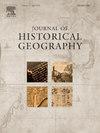Where was Dien Bien Phu? Oey Hong Lee's eventful geography of decolonization
IF 1.1
2区 历史学
Q2 GEOGRAPHY
引用次数: 0
Abstract
This article revisits mid-20th century Asia, Southeast Asia especially, when the promise of decolonization met the perils of the Cold War. Empirically, it discusses the life and work of journalist, scholar-activist, and underacknowledged theorist of anticolonial internationalism, Oey Hong Lee (1924–1992). His 1961 Indonesian-language book Asia Won in Dien Bien Phu narrates the 1954 battle and negotiations between France and Vietnam that ended the First Indochina War (1946–54) and won independence for Vietnam, Laos, and Cambodia. Theoretically, it puts Asia Won in dialog with ideas of worldmaking, space-time, and eventful temporality to argue for an eventful geography of decolonization. Excavating Oey's biography and analyzing his itineraries centers the perspective of a historical actor and illustrates how he experienced decolonization eventfully. It also puts Oey's work in dialog with contemporaneous scholar-activists including Aimé Césaire, Frantz Fanon, and Albert Memmi. Focused on decolonization and geopolitical struggle in Asia, Oey analyzed less the universal binary between colonizer and colonized and more the specific histories of place, in this case Vietnam, Indonesia, and their emerging relations at the vanguard of a postcolonial Asia.
奠边府在哪里?李宏的非殖民化地理学
本文回顾了20世纪中期的亚洲,尤其是东南亚,当时非殖民化的承诺遭遇了冷战的危险。从经验上讲,它讨论了记者、学者活动家和不被认可的反殖民国际主义理论家李鸿利(1924-1992)的生活和工作。他1961年出版的印尼语书《亚洲在奠边府获胜》讲述了1954年法国和越南之间的战斗和谈判,这场战斗结束了第一次印度支那战争(1946-54),并为越南、老挝和柬埔寨赢得了独立。从理论上讲,它将亚洲与世界形成、时空和事件性的思想进行对话,以论证非殖民化的事件地理学。挖掘欧伊的传记,分析他的行程,以一个历史演员的视角,说明他是如何经历非殖民化的。它还将Oey的作品与同时代的学者活动家进行对话,包括aim csamsaire, Frantz Fanon和Albert Memmi。Oey专注于亚洲的去殖民化和地缘政治斗争,他较少分析了殖民者和被殖民者之间普遍的二元对立,而更多地分析了具体的地方历史,在这个案例中,越南,印度尼西亚,以及它们在后殖民时期亚洲先锋的新兴关系。
本文章由计算机程序翻译,如有差异,请以英文原文为准。
求助全文
约1分钟内获得全文
求助全文
来源期刊

Journal of Historical Geography
Multiple-
CiteScore
1.50
自引率
10.00%
发文量
53
期刊介绍:
A well-established international quarterly, the Journal of Historical Geography publishes articles on all aspects of historical geography and cognate fields, including environmental history. As well as publishing original research papers of interest to a wide international and interdisciplinary readership, the journal encourages lively discussion of methodological and conceptual issues and debates over new challenges facing researchers in the field. Each issue includes a substantial book review section.
 求助内容:
求助内容: 应助结果提醒方式:
应助结果提醒方式:


